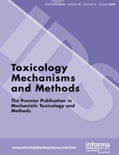
TOXICOLOGY MECHANISMS AND METHODS
metrics 2024
Empowering researchers with cutting-edge toxicology studies.
Introduction
TOXICOLOGY MECHANISMS AND METHODS is a distinguished peer-reviewed journal dedicated to the advancement of toxicological research, published by Taylor & Francis Ltd. With its ISSN 1537-6516 and E-ISSN 1537-6524, this esteemed journal features critical studies and innovative methodologies in the field of toxicology, aligning with its mission to enhance understanding of biological mechanisms and risk assessment. The journal holds a commendable Q2 ranking in both the Health, Toxicology and Mutagenesis, and Toxicology categories, as well as strong positions in Scopus rankings, reflecting its influence with a 71st percentile rank in Toxicology and a 69th percentile rank in Environmental Health. Researchers, professionals, and students in the toxicology domain will find this journal to be an invaluable resource, offering open access options that foster widespread dissemination of its findings. Since its inception, encompassing converged years from 1991 to 1995 and from 2002 to 2024, the journal remains at the forefront of critical discourse and innovative research methods, making it a vital platform for advancing toxicological science globally.
Metrics 2024
 0.69
0.69 2.80
2.80 3.40
3.40 55
55Metrics History
Rank 2024
Scopus
IF (Web Of Science)
JCI (Web Of Science)
Quartile History
Similar Journals
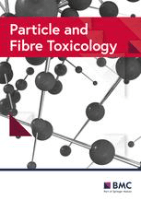
Particle and Fibre Toxicology
Advancing knowledge on particulate health impacts.Particle and Fibre Toxicology is a leading open-access journal dedicated to advancing the field of toxicology, specifically focusing on the health impacts of particulate matter and fibers. Published by BMC since 2004, this journal operates from its offices in the United Kingdom and has gained significant recognition in the scientific community, achieving an impressive impact factor that highlights its relevance and influence. As indicated by its Q1 ranking in various categories including Health, Toxicology and Mutagenesis and Medicine (miscellaneous), it occupies a prestigious position in the academic landscape, appealing to researchers, professionals, and students alike. With a Scopus ranking of #4 in Toxicology and #7 in Environmental Science, the journal ensures high visibility and accessibility, providing a platform for the dissemination of key research findings and innovative methodologies in the interdisciplinary domains of toxicology. Through its commitment to open access, Particle and Fibre Toxicology fosters knowledge-sharing and collaboration, facilitating significant advancements in our understanding of the toxicological effects of environmental agents.
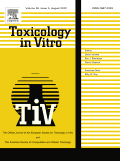
TOXICOLOGY IN VITRO
Fostering Global Collaboration in Toxicological ResearchTOXICOLOGY IN VITRO is a premier journal published by PERGAMON-ELSEVIER SCIENCE LTD, focusing on the latest advancements in the field of toxicology, particularly through in vitro methodologies. With an ISSN of 0887-2333 and an E-ISSN of 1879-3177, this journal serves as a critical platform for researchers aiming to disseminate their findings in toxicology, emphasizing innovative approaches and applications in pharmacology and toxicology. Featuring a commendable impact factor and classified in the second quartile (Q2) for both Medicine (miscellaneous) and Toxicology in 2023, the journal holds a significant position within the academic community, ranking 41st out of 133 in the Toxicology category according to Scopus, representing the 69th percentile. Despite being a subscription-based publication, it continuously attracts submissions from leading scientists worldwide, fostering a vibrant exchange of scientific knowledge. Since its inception in 1987, TOXICOLOGY IN VITRO has consistently aimed to enhance understanding of toxicological challenges, making it an invaluable resource for professionals, students, and researchers dedicated to developing safer pharmaceuticals and understanding the biological pathways influenced by potential toxic agents.

CHEMICAL RESEARCH IN TOXICOLOGY
Transforming toxicological research into public health advancements.Chemical Research in Toxicology is a premier journal published by the American Chemical Society, dedicated to advancing the understanding of toxicological effects associated with chemical substances. Since its inception in 1988, this esteemed journal has maintained a robust impact factor, ranking in the Q1 quartile for both Medicine (miscellaneous) and Toxicology as of 2023, reflecting its significance and influence in the fields of pharmacology and toxicology. With an impressive Scopus ranking at #16 out of 133 in the Toxicology category, it serves as a vital resource for researchers, professionals, and students seeking cutting-edge insights and scholarly articles that bridge the gap between chemistry and toxicological science. Although not an open-access publication, it continues to provide comprehensive analyses and original research that inform safe chemical practices and regulatory policies, further enhancing its role in public health and safety.
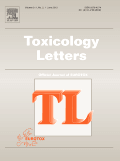
TOXICOLOGY LETTERS
Exploring the intricate dance between chemicals and biology.TOXICOLOGY LETTERS is a prominent journal dedicated to advancing the field of toxicology, providing a platform for high-quality research and reviews that explore the effects of chemical substances on biological systems. Published by Elsevier Ireland Ltd, this peer-reviewed journal has established itself as a vital resource in toxicological research since its inception in 1977, with a convergence of studies extending to 2024. With an impressive Scopus ranking, positioned at #28 out of 133 in the Toxicology category, TOXICOLOGY LETTERS garners a respectable percentile of 79, highlighting its significance in the academic community. Although it is not an open-access journal, its research is accessible through institutional subscriptions, ensuring that critical insights into human health and environmental safety are disseminated effectively. Being categorized in the Q2 quartile in both Medicine (miscellaneous) and Toxicology for 2023 further emphasizes its relevance and impact in these fields. This journal aims to foster collaboration between researchers and professionals, encouraging the exploration of innovative solutions to chemical hazards and the promotion of safer practices in pharmacology and toxicology.

Toxicology and Environmental Health Sciences
Unraveling Environmental Risks for a Healthier TomorrowToxicology and Environmental Health Sciences is a peer-reviewed journal published by the Korean Society for Environmental Risk Assessment & Health Science, dedicated to advancing the fields of toxicology and environmental health. With an ISSN of 2005-9752 and E-ISSN 2233-7784, this journal serves as a vital platform for researchers, professionals, and students seeking to explore the intricate relationships between environmental risks and public health. Operating from South Korea, it has a converged years span from 2009 to 2024, and currently holds a respectable Q3 quartile ranking in both Health, Toxicology and Mutagenesis and Toxicology. This positions the journal within a critical space for those invested in understanding and mitigating environmental health challenges. Although not an open-access journal, it continues to foster high-impact research, contributing to a better understanding of toxicological sciences and environmental health dynamics. Engage with the latest findings and discussions that shape this evolving field through the insightful articles published herein, reinforcing its importance as a resource for scholars and practitioners alike.

Toxicology Research
Unveiling the complexities of toxic substances.Toxicology Research is a distinguished journal dedicated to advancing the field of toxicology through the dissemination of high-quality research. Published by Oxford University Press, this UK-based journal focuses on critical aspects of toxicology and mutagenesis, highlighting both environmental and pharmacological implications. With an ISSN of 2045-452X and an E-ISSN of 2045-4538, it serves as a valuable resource for researchers, professionals, and students alike. Currently categorized in the Q3 quartile for Health, Toxicology and Mutagenesis, as well as Toxicology in 2023, Toxicology Research maintains a visible presence in Scopus rankings, positioning itself within the targeted professional community. Although the journal operates without open access options, its importance in contributing to scientific discussions and policy formation is undeniable. Covering content from 2012 to 2024, it continues to provide insights into contemporary toxicological challenges, thereby fostering interdisciplinary collaborations and informing best practices in health and safety.
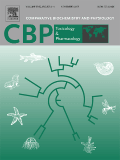
COMPARATIVE BIOCHEMISTRY AND PHYSIOLOGY C-TOXICOLOGY & PHARMACOLOGY
Bridging Laboratory Discoveries with Real-World ApplicationsComparative Biochemistry and Physiology C-Toxicology & Pharmacology, published by Elsevier Science Inc, stands as a prominent resource in the fields of pharmacology, toxicology, and biochemical research. With its ISSN 1532-0456 and E-ISSN 1878-1659, this journal has carved out a significant niche, focusing on the comparative aspects of biochemical and physiological data across various species. Recognized for its impact in diverse fields, it boasts a Q1 ranking in Animal Science and Zoology, Aquatic Science, Health, Toxicology and Mutagenesis, alongside respectable standings in other related disciplines. Researchers and professionals can leverage this publication to access high-quality, peer-reviewed studies that advance the understanding of biochemical processes and their toxicological implications. The journal aims to bridge the gap between laboratory findings and real-world applications, fostering an environment for interdisciplinary collaboration. For academics seeking to enhance their knowledge or contribute to this impactful field, Comparative Biochemistry and Physiology C-Toxicology & Pharmacology serves as an invaluable platform.

JOURNAL OF APPLIED TOXICOLOGY
Connecting Researchers to the Future of ToxicologyJOURNAL OF APPLIED TOXICOLOGY, published by Wiley, stands as a leading platform in the field of toxicology, focusing on the rigorous examination of chemical substances and their effects on biological systems. With an impressive Impact Factor, it ranks in the top quartile (Q2) for toxicology journals, reflecting its esteemed position within the scientific community. The journal, identifiable by its ISSN 0260-437X and E-ISSN 1099-1263, has been an invaluable resource since its inception in 1981, and it continues to serve as a conduit for innovative research and practical applications through 2024. Positioned at the forefront of the field, it garners recognition in the Scopus Rankings, where it ranks #31 out of 133 journals in the toxicology category, placing it in the 77th percentile—a testament to its contribution to the advancement of pharmacology and toxicological sciences. While not an open-access journal, it remains accessible to a wide audience of researchers, professionals, and students eager to explore cutting-edge findings in applied toxicology, making it a pivotal resource for enhancing knowledge and fostering collaboration in the field.

Journal of Environmental Science and Health Part C-Toxicology and Carcinogenesis
Pioneering Research for a Healthier TomorrowThe Journal of Environmental Science and Health Part C-Toxicology and Carcinogenesis is a vital publication in the fields of environmental science, toxicology, and cancer research, published by Taylor & Francis Inc. With an ISSN of 2689-6583 and E-ISSN 2689-6591, this journal provides a platform for peer-reviewed research that explores the intersection of environmental factors and health outcomes, particularly focusing on toxicological and carcinogenic impacts. Though it does not currently offer Open Access, it remains a significant contributor to academia with its current ranking in the Q4 category for Cancer Research and Q3 in Health, Toxicology and Mutagenesis. The journal has converged from 2020 to 2024 and aims to disseminate pioneering studies that inform public health policies and foster a deeper understanding of environmental toxins. Aspiring researchers, professionals, and students will find this journal to be an essential resource for the latest findings and discussions within these critical fields.
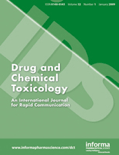
DRUG AND CHEMICAL TOXICOLOGY
Exploring the intersection of health and chemical science.Drug and Chemical Toxicology is a well-respected journal in the fields of toxicology, pharmacology, and public health, published by Taylor & Francis Ltd. Since its inception in 1978, this journal has diligently explored the effects and mechanisms of chemical exposures on health and the environment, fulfilling a crucial role in advancing scientific understanding and safeguarding public health. The journal is indexed across prestigious databases and features an impressive array of articles categorized within the Q2 and Q3 quartiles across various categories in 2023, reflecting its significance in Chemical Health and Safety as well as Environmental and Occupational Health disciplines. With an extensive reach and a focus on interdisciplinary research, Drug and Chemical Toxicology offers a rich repository of original research, reviews, and methodological advancements, catering to a diverse audience of researchers, professionals, and students dedicated to the betterment of safety and health standards. Although not an open-access publication, its articles are widely accessible to the academic community, ensuring that critical innovations and insights are shared for the greater good.